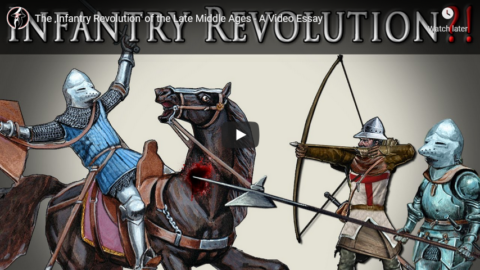SandRhoman History
Published 21 Feb 2021CuriosityStream link: https://curiositystream.com/sandrhoman
The “Infantry Revolution” of the late Middle Ages is kind of a hot topic among armchair historians and academics alike. This is how the argument goes: In the late Middle Ages, infantry grew in importance to the detriment of heavy cavalry; by then battles were increasingly won with pikes, longbows and arquebuses instead of mounted knights with lances, the argument continues, and as a result of that, the socio-political make-up and development of European polities changed lastingly. So, this Infantry Revolution supposedly had an incredible impact on European state building processes AND, the argument finally concludes, it laid the foundation to Europe’s conquest and colonization of many parts of the world. However, in public spaces such as YouTube this whole debate is more discussed in regards to tactics and fighting techniques than economics and politics. Consequently, much of the public discussion is about how and if the importance of knights changed after the High Middle Ages. Likewise, topics such as the efficacy of the English longbow or the impact of pikes in the late Middle Ages are frequently the subject of discussions. All of that is controversial to say the least but it gets worse: these changes must be viewed in the broader military changes such as the rise of gunpowder artillery between 1420 and 1530 — called an artillery revolution — the decline of sieges between the 1420s and the 1530s which, among many things, led to the resurgence of heavy cavalry in the later late Middle Ages. Lastly, all of these revolutions belong to a notion called “military revolution”. This video is not intended to argue one side or the other of the “infantry revolution” but to provide a broad overview over both the debate and the military changes during the 14th and 15th centuries. It explains how contemporary historiography quarrels over the infantry revolution.
Patreon: https://www.patreon.com/sandrhomanhis…
Twitter: https://twitter.com/SandrhomanBibliog…
Bibliography:
Bane, M., English Longbow Testing against various armor circa 1400, 2006.
Ayton, A., / Price, J. L., (Hrsg.), The Medieval Military Revolution. State, Society and Military Change in Medieval and Early Modern Europe, 199J.
Black, A Military Revolution? Military Change and European Society 1550–1800, 1991.
Devries, K., Medieval Military Technology, 1994.
Dierk, W., s.v. “Heeresreform”, in: Enzyklopädie der Neuzeit
Ortenburg, G., “Waffe und Waffengebrauch im Zeitalter der Landsknechte” (Heerwesen der Neuzeit, Abt. 1, Bd. 1) Koblenz 1984.
Magier, Mariusz; Nowak, Adrian; et al., “Numerical Analysis of English Bows used in Battle of Crécy”. Problemy Techniki Uzbrojenia. 142 (2), 2017, 69–85.
Meumann, M., s.v. “Military Revolution”, in: Enzyklopädie der Neuzeit.
Parker G., “The ‘Military Revolution’, 1560–1660 – a Myth?”, in: Journal of Modern History 48.2, 1976, 196–214
Parker, G., Die militärische Revolution. Die Kriegskunst und der Aufstieg des Westens 1500–1800, 1990 (Engl. 1988)
Roberts, M.: “The military revolution, 1560–1660”. In: Clifford J. Rogers: The military revolution debate. Readings on the military transformation of early modern Europe. Westview Press, Boulder, Colo. 1995, S. 13–35.
Rogers, C.J. / Tallet F. (editors), European Warfare, 1350–1750, 2010.
Rogers, C.J., The Efficacy of the English Longbow, 1998.
Schmidtchen, Volker, Kriegswesen im späten Mittelalter. Technik, Taktik, Theorie, Weinheim 1990.
Soar, H., Gibbs, J., Jury, C., Stretton, M., Secrets of the English War Bow. Westholme, 2010, pp. 127–151.
February 22, 2021
The “Infantry Revolution” of the Late Middle Ages
The Best BAR: Luxembourg .30-06 FN-D at the Range
Forgotten Weapons
Published 17 Nov 2020http://www.patreon.com/ForgottenWeapons
https://www.floatplane.com/channel/Fo…
Cool Forgotten Weapons merch! http://shop.bbtv.com/collections/forg…
I normally want to have something specific to demonstrate when I take a gun to the range, but today I don’t. What I have today is and FN-D, the very best iteration of the Browning Automatic Rifle (BAR) — and I just wanted an excuse to take it out to enjoy. Specifically, this is a Luxembourg contract FN-D chambered for .30-06. So, please pardon my flimsy excuse, and enjoy!
Contact:
Forgotten Weapons
6281 N. Oracle #36270
Tucson, AZ 85740
QotD: Modern academic “life”
The point of all this isn’t just more academia-bashing (fun as that is, and thank you Jesus for early retirement). The point is: Life deals people bad hands. Many, perhaps most, of the people I know in academia are there because they really can’t do anything else — a combination of (as they feel it) genes and circumstance has landed them there, and while it looks like a really cushy upper-middle-class life materially, spiritually it’s the pits, because it’s aesthetically awful. The Classical Greek adage that the Good is the True is the Beautiful might not be factually accurate, but it sure feels right …
… and never more than to people who know themselves un-beautiful, therefore not good, therefore false, and locked in it. Forever.
These people hate us, not because we’re better looking, more socially skilled, or whatever — this is, after all, the Internet — but because we’ve got options. We’re not all fighting over who gets to be Big Fish in an ever-shrinking pond. We’re different things to different people; we haven’t collapsed our social context down to faculty mixers and the one or two non-hamplanet grad students who are silly enough to apply each semester. We can go days, maybe even weeks, without obsessively comparing ourselves to our peers. We don’t care that we’re not “Chad” or “Stacy,” because we’ve got other settings on the emotional dial than “smugness” and “jealousy.”
But we need to start caring. I don’t mean getting obsessive over our appearance. I mean that, since this is in many ways an aesthetic battle, aesthetics will help us win. I half-jokingly suggested a “Normal Guy Uniform” a while back – an all-white ball cap with the New England Patriots’ logo on it. I’m not really kidding now. The Left wins, in large part, because they’re fugly losers that no normal person could possibly consider a threat … until they bash your skull in, or get you fired, or send a SWAT team to your house.
Severian, “Politics for Fugly People”, Rotten Chestnuts, 2018-08-24.






